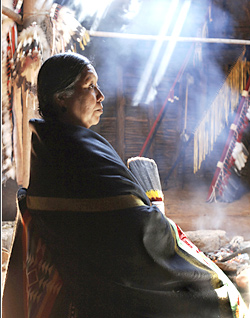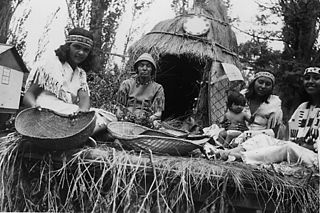Related Research Articles

Survivor: Marquesas is the fourth season of the American CBS competitive reality television series Survivor. The season filmed from November 12, 2001 to December 20, 2001, and premiered on February 28, 2002. Hosted by Jeff Probst, it featured sixteen new contestants competing for 39 days on the island of Nuku Hiva in the Marquesas Islands of French Polynesia.
Geffen Records is an American record label, founded in 1980 by David Geffen. Originally a music subsidiary of the now-defunct Geffen Pictures, it is owned by the Interscope Geffen A&M faction of Universal Music Group.

The Ponca people are a nation primarily located in the Great Plains of North America that share a common Ponca culture, history, and language, identified with two Indigenous nations: the Ponca Tribe of Indians of Oklahoma or the Ponca Tribe of Nebraska.

The Scheduled Castes and Scheduled Tribes are officially designated groups of people and among the most disadvantaged socio-economic groups in India. The terms are recognized in the Constitution of India and the groups are designated in one or other of the categories. For much of the period of British rule in the Indian subcontinent, they were known as the Depressed Classes.

The Plains Apache are a small Southern Athabaskan group who live on the Southern Plains of North America, in close association with the linguistically unrelated Kiowa Tribe. Today, they are centered in Southwestern Oklahoma and Northern Texas and are federally recognized as the Apache Tribe of Oklahoma.

Barbari bread is a type of yeast leavened flatbread. It is one of the thickest flat breads and is commonly topped with sesame or black caraway seeds. A notable characteristic of the bread is its top skin that is similar to pretzels or lye roll's skin due to the Maillard reaction that occurs during baking. Before baking it is glazed with a mixture of baking soda, flour and water. It is widely known as Persian flatbread in United States and Canada.
The Gisu people, or Bamasaba people of Elgon, are a Bantu tribe and Bantu-speaking ethnic group of the Masaba people in eastern Uganda, closely related to the Bukusu people of Kenya. Bamasaba live mainly in the Mbale District of Uganda on the slopes of Mount Elgon. The Bagisu are estimated to be about 1,646,904 people making up 4.9% of the total population according to the 2014 National Census of Uganda.

Simeon was the second of the six sons of Jacob and Leah, and the founder of the Israelite tribe, The Tribe of Simeon, according to the Book of Genesis of the Hebrew Bible. Biblical scholars regard the tribe as having been part of the original Israelite confederation. The tribe is absent from the parts of the Bible. Some scholars think that Simeon was not originally regarded as a distinct tribe. However, many Biblical scholars believe that Simeon isn't regarded as a distinct tribe due to the scandal involving Zimri. The Blessing of Moses before his death had omitted the Tribe of Simeon because Jacob had castigated him Genesis 49:5-7, and because of the terrible affair of Baal-peor.
Palay Khan , also referred to as Palay Shah, was an ethnic Pashtun from the Khosti tribe in zhob, a freedom fighter, and commander of the group that fought against the British Raj in 1930 in Baluchistan. Khosti was living in Zhob when he died on January 1, 1951. Palay Khan never accepted an agreement between his group and the British Raj, against some compensation in favor of the earlier. The British promised him that they would agree to the Tribal Laws as the Constitution and Laws for his land.

Ennominae is the largest subfamily of the geometer moth family (Geometridae), with some 9,700 described species in 1,100 genera. Most species are fairly small, though some grow to be considerably large. This subfamily has a global distribution. It includes some species that are notorious defoliating pests. The subfamily was first described by Philogène Auguste Joseph Duponchel in 1845.

The Magyar or Hungarian tribes or Hungarian clans were the fundamental political units within whose framework the Hungarians (Magyars) lived, before the Hungarian conquest of the Carpathian Basin and the subsequent established the Principality of Hungary.
Çullu is a village is a village situated on Goyan steppe, 27 km west of the city of Jabrayil, within the Dagh Tumas administrative-territorial unit of Jabrayil District, Azerbaijan.

Oketo is a former Yurok settlement in Humboldt County, California, but experts differ on what the names were of the settlement itself and of the nearby waterway now called Big Lagoon. Yurok author Chenahwah Weitchahwah used the name Ah-ca-tah when mentioning the location of a religious practice but was unclear whether she was naming the village or lagoon. Peter Palmquist placed the village at the south shore of the lagoon. A. L. Kroeber said the village was called Opyuweg, mapping it in more detail. T. T. Waterman said the lagoon was named Oketo and pinpointed the village most precisely as Opyuweg, setting it west of a southern promontory of the lagoon and of a settlement called piNpa. Coastal Yuroks call themselves Ner-'er-'ner or Ner-er-ner and upriver Yuroks call themselves Pue-lik-lo' or Polikla. In his notes, C. H. Merriman recorded that Oketo was the name the Polikla or Pue-lik-lo' used for a Ner-er-ner village at Big Lagoon.

The Bishop Paiute Tribe, formerly known as the Paiute-Shoshone Indians of the Bishop Community of the Bishop Colony is a federally recognized tribe of Mono and Timbisha Indians of the Owens Valley, in Inyo County of eastern California. As of 2022, the United States census showed the Bishop Paiute Tribe's population at 1,914.
The Kulhaiya is a Muslim community found in the northeastern part of the Indian state of Bihar, India, as well as the Terai region of south-east Nepal.

The Jie are an ethnic group in Uganda. They belong to the Karamojong Cluster, which also includes the Karamojong and Dodoth people. Their country in northeast Uganda lies between the Dodoth to the north and the Karamojong to the south.

Neom is a new urban area planned by the Kingdom of Saudi Arabia to be built in its northwestern Tabuk Province. The site is north of the Red Sea, east of Egypt across the Gulf of Aqaba and south of Jordan. The total planned area of Neom is 26,500 km2 (10,200 sq mi). The city's plans include multiple regions, including a floating industrial complex, global trade hub, tourist resorts and a linear city powered by renewable energy sources. It was launched in 2017 by Saudi crown prince Mohammed bin Salman.
Australian Survivor: Titans V Rebels is the eleventh season of Australian Survivor, which premiered on Network 10 on 29 January 2024 and is based on the international reality game show franchise Survivor. In this season, twenty-four contestants were stranded in Samoa and divided into two tribes of "Titans" and "Rebels".
References
- ↑ Mvuba at Ethnologue (18th ed., 2015) (subscription required)
- ↑ "Tribes_3 – QSafarisAfrica" . Retrieved 2024-02-13.
- ↑ "Baganda, Banyankore, Basoga dominant tribes". Monitor. 2021-01-16. Retrieved 2024-02-13.